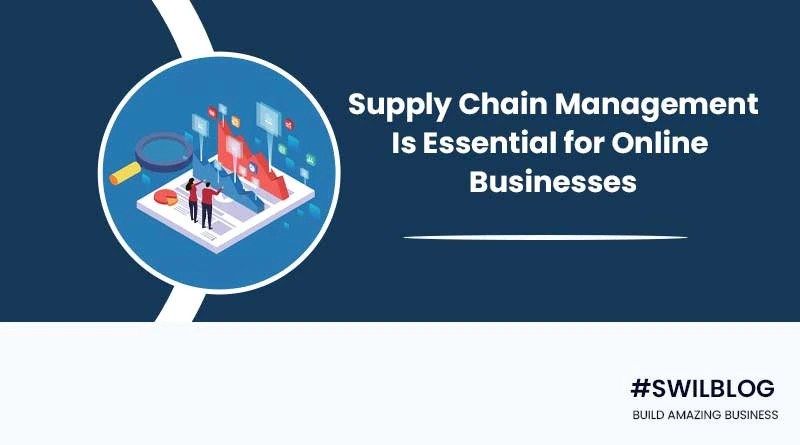Online Business- as simple as it sounds, but it involves a whole lot of activities. It includes managing logistics, the configuration of products, a safe payment gateway, and the supply chain.
In this blog, we’ll be discussing in detail the Supply Chain Management in eCommerce. Nuances on how to sell online, its advantages, its disadvantages, and much more.
Towards the end, we’ll also contemplate various ways in which one can sell, particularly on Amazon.
SOME FACTS ABOUT E-COMMERCE
It’s estimated that by 2040 the e-commerce market will command 95% of all purchases worldwide. And, India certainly is not an exception. The Indian e-grocery market is expected to reach US$ 18.2 billion by 2024. The primary beneficiary segments are wellness, personal care, beauty, and groceries.
SUPPLY CHAIN MANAGEMENT IN ONLINE BUSINESSES
Ecommerce refers to trading goods online. For ensuring smooth eCommerce operations, a well-organized supply chain is a must. It ensures that all your customer’s demands are met. A few key areas of focus in the supply chain include:
- Procurement of raw materials
- Managing demand and supply
- Inventory tracking
- Order management
- Distribution and delivery (Fast Delivery)
- Managing inward delivery ( Returns)
Hiccups include delays in material procurement from vendors, logistic errors, and delayed delivery. It can badly impact the image of the business. Several options available with online sellers are:
Amazon dropped shipping/fulfillment options
Logistics providers like Delicate, Delivers, BlueDart, and DHL are specializing in eCommerce delivery.
ADVANTAGES OF SELLING ONLINE
Now let’s talk about the advantages of selling online:
Flexibility: An online presence gives your business the flexibility to provide its services 24*7. Customers can choose from the wide range of products online that are available in physical stores. They can buy quickly and conveniently.
Cost reduction: An online store requires a tiny investment. Unlike offline stores, you don’t have to pay rent, electricity charges, labor charges, and maintenance. You only need a well-working website/ e-store and robust logistics.
Easy Marketing: Online stores give sellers an option to present their products the way they want. High-quality images, videos give your customers a 360-degree view of your products. Visual appeal and discount offer tempt the visitors into buying.
Worldwide Audience: Online sellers can sell internationally with an online presence. They can cater to the overseas market and can expand the business. It also gives you a competitive edge over competitors, only catering to the domestic market.
Reach: An online business can reach anyone and everyone at any given point in time. This is not possible with offline stores that only cater to a particular locality. Customers provide their phone numbers, email addresses, and addresses. Businesses in this way have multiple channels to communicate with their customers.
Analytics: Sellers can track their sales, sales volume, most sold products, etc. These metrics help them better target their customers in advertisements. This eventually helps enhance sales at a low cost.
Reminders and payment options: Sellers can remind their prospects of the left items in their cart. They can give them offers for the same, via messages and emails. They can even provide multiple payment options via their online store, like credit-debit cards, net banking, COD, EMI’s, UPI, etc.
Others: Online presence also gives your business credibility and reach. Reviews by customers provide quality assurance to the products. It also enhances sales and builds customer loyalty.
DISADVANTAGES OF SELLING ONLINE
There are many advantages to starting an online store. However, if not done correctly, they might turn into disadvantages. Let’s consider the following:
Technical constraints: Your online store may face technical issues, or the site may crash. This happens if the hosting plan is incompatible with receiving massive traffic. In this scenario, the website loses much business. An offline store, on the other hand, does not face any such issues.
Delay in responding to queries: Offline stores address customer and product-related questions quickly. Online stores, however, take time to handle queries. Customers expect you to address their queries as soon as possible. If you delay, they might shop somewhere else.
THINGS TO KEEP IN MIND WHILE SELLING ONLINE
There are certain things to keep in mind while selling online. Customers have many options to choose from, including online. For you to stand out, these are the points one must contemplate.
Delivery Time: You must ensure the delivery in a maximum of 3-4 days. Customers don’t wish to wait that long for the product. You can even show the estimated delivery time/ date before a customer checks out for payment. Sellers may allow their customers an option to track delivery. This leads to customer interaction with the business, which in turn enhances the user experience.
Returns: With free returns becoming a trend, customers expect businesses to facilitate easy returns. One of the main reasons for Amazon’s success is its customer-centric approach. This involves free delivery and easy returns. Although this might hurt the bottom line of the business, it enhances the seller-customer relationship. It benefits the seller in the future.
Product Bundling: It refers to selling/ recommending related products to the purchaser of the product. For Eg- Amazon, once the user reaches the checkout page, recommends buying similar products. A classic example for the same can be an offer to purchase ketchup with bread. This not only serves the customer with better prices but also enhances your earnings and margins.
HOW DOES THE AMAZON SUPPLY CHAIN WORK
When it comes to eCommerce, nothing beats Amazon. Amazon has been investing in customer service, which has helped them create mass trust and a large customer base. It’s highly talked about the model being the one that allows delivery within 1-2 days.
Amazon has an extensive network of fulfillment centers and delivery partners to fulfill the order at any time, bound to anywhere. In this case, Amazon can easily depend on its distribution partners to fulfill the orders.
Its supply chain uses automation and robots that help them to cut down costs and be efficient. It also cuts down heavenly on warehousing costs by keeping sufficient inventory to meet demand.
Amazon offers two options to its sellers, namely
FBA (Fulfillment By Amazon) – This option allows sellers to store their products in Amazon’s fulfillment centers/ warehouses. Sellers have to transport their goods to the nearest Amazon store units, and the rest will be taken care of by Amazon. This facility allows sellers to access Amazon’s logistics and Prime Delivery options at a negligible cost. It is a convenient, cost-effective, and win-win deal for both sellers and Amazon. Sellers with limited resources, catering small and light products, and fast turnover can benefit from this option.
FBM (Fulfillment By Merchant) – This option allows sellers to store and ship their products themselves. Sellers will have to list their products on Amazon’s website, and the logistics will have to be looked at by the sellers themselves. This saves Amazon a lot of its inventory costs. However, unlike FBA, this doesn’t have Prime delivery options.
WRAPPING UP
Hence, even when starting with your online store, Supply Chain Management has a pivotal role to play. The software makes management and operations easy by automating functions.









